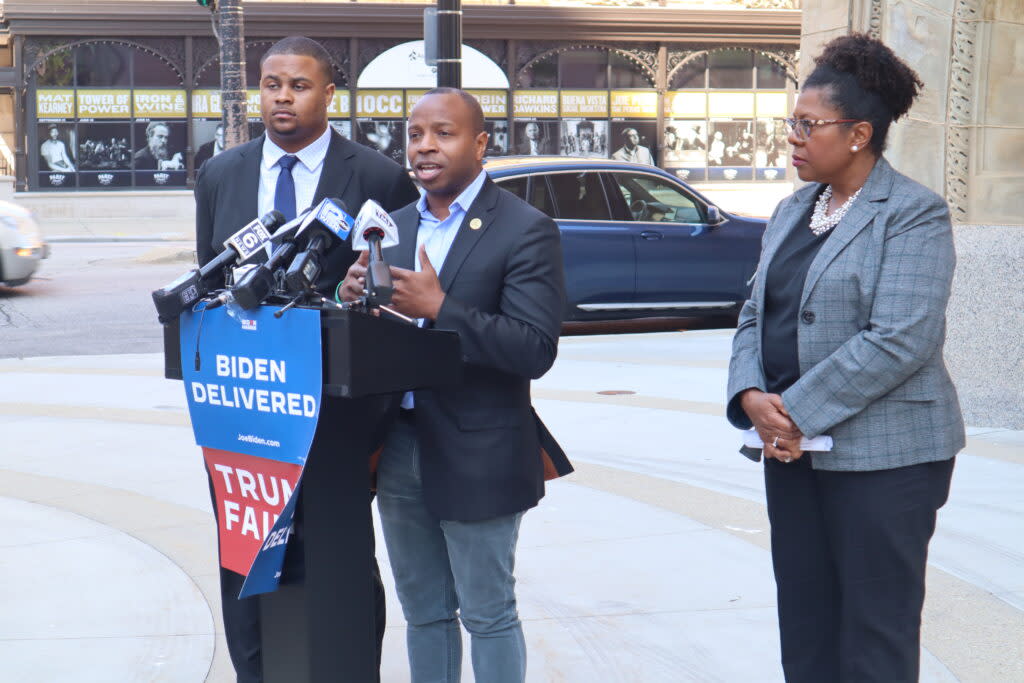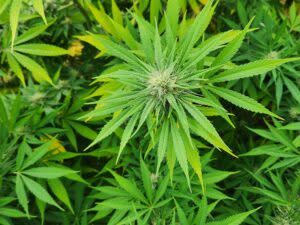Milwaukee elected leaders praise rescheduling of cannabis by Biden Administration

- Oops!Something went wrong.Please try again later.
- Oops!Something went wrong.Please try again later.
- Oops!Something went wrong.Please try again later.
- Oops!Something went wrong.Please try again later.
Mayor Cavalier Johnson joined by Sen. LaTonya Johnson (D-Milwaukee) and Rep. Kalan Haywood (D-Milwaukee). (Photo | Isiah Holmes)
Milwaukee Mayor Cavalier Johnson, joined by Sen. LaTonya Johnson (D-Milwaukee) and Rep. Kalan Haywood (D-Milwaukee), celebrated the ongoing rescheduling of cannabis by the Biden Administration. The plant, better known as marijuana, has been listed as a Schedule I narcotic for decades, placing it in the same category as highly dangerous drugs which do not have accepted medicinal uses or have high risks for abuse. Reclassifying cannabis as a Schedule III substance acknowledges the plant’s medicinal properties, and adjusts the penalties for possessing it.
“President Biden and Democrats have been leaders on this issue: fighting to right historical wrongs and reform our marijuana laws and policies,” said Milwaukee Mayor Cavalier Johnson, who called the schedule change “a historic shift in federal policy.” For decades, cannabis shared the Schedule I classification with heroin, but also substances like Lysergic Acid Diethylamide (LSD) and 3,4-methylenedioxymethamphetamine — better known as ecstasy or molly — both of which have been studied for therapeutic use. Peyote, a visionary cactus-derived brew used ceremonially by some North American indigenous tribes which contains mescaline, is also listed as Schedule I. Lowering the status of cannabis to Schedule III acknowledges its medicinal potential, and that it has a lower risk of abuse or harm to the body than drugs like oxycodone, fentanyl, and methamphetamine which are listed as Schedule II. Reclassifying cannabis as Schedule III puts the plant and products derived from it in the same category as aspirin.
The federal decision does little to change the legal status of cannabis in Wisconsin, however. Every state bordering Wisconsin has some form of legalized cannabis. Regardless, efforts at legalizing even medicinal cannabis in Wisconsin has been unsuccessful in the Legislature. Gov. Tony Evers has repeatedly proposed a fully legalized recreational program, aiming to reverse the state’s loss of over $36 million in revenue to Illinois alone as residents cross the border to buy cannabis. Republicans instead proposed a very limited program that would only allow medicinal cannabis in a pill, tincture, or topical form and only for certain chronic conditions.
“We are not Illinois,” Assembly Speaker Robin Vos said last year. “We are not California. We are not Colorado…We are a state that’s at best purple,” he added. “And purple is not legalization of recreational cannabis.” Outside the Capitol, however, Wisconsinites across the political spectrum support legalization. In November 2022, ballot initiatives asking whether cannabis should be legalized statewide passed with nearly 75% of the vote on average.
Moving Wisconsin in a different direction will take time. Still, the mayor and state representatives applauded the Biden administration for doing more than former President Donald Trump. “I am grateful that President Biden has taken this important step to bring marijuana policy into the twenty-first century,” said state Senator Johnson. “Reclassifying marijuana will help reverse longstanding injustices in our legal system that have disproportionately targeted Black and brown Wisconsinites. If Trump has his way, he’ll roll back all the progress we’ve made under President Biden.”
State Rep. Haywood echoed the sentiment. “Putting people in jail for simply possessing or using marijuana upends lives and tears families apart. And that criminal record follows you even after you’ve left prison by making it harder to buy a home, find a job, or get a loan to start a small business. President Biden’s announcement will help address some of those historical inequities,” Haywood said. “I’m proud to be working here in Wisconsin at the state level to stop Republicans from blocking our efforts and to join our Midwest neighbors on marijuana reform. And thanks to the Biden-Harris administration, we’ll have the federal support we need to continue that fight.”
The mayor, senator, and representative all pointed to a variety of issues persisting in Wisconsin due to prohibition. Although the City of Milwaukee and Madison have taken steps to deprioritize cannabis enforcement, other communities have doubled down on prohibition. Fines for possession range wildly, and can total hundreds of dollars or more. Multiple arrests for possession can quickly lead to felony charges. Last month, the City of Milwaukee’s Fire and Police Commission discussed policy changes within the Milwaukee PD, where the smell of cannabis can no longer be used to justify a search by police. Similarly, evidence of burned cannabis in a vehicle is no longer adequate to justify a search in the City of Milwaukee.
When asked who benefits from cannabis prohibition in Wisconsin, Haywood and Johnson said neighboring states benefit. Legislation supporting cannabis legalization, even in its limited form under Republican bills, has been opposed by the Wisconsin Chiefs of Police Association and the Wisconsin Medical Society.
GET THE MORNING HEADLINES DELIVERED TO YOUR INBOX
The post Milwaukee elected leaders praise rescheduling of cannabis by Biden Administration appeared first on Wisconsin Examiner.


